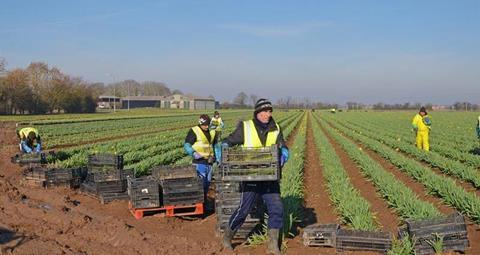Ministers will urge Rishi Sunak to increase immigration and food prices during Downing Street talks tomorrow

Defra ministers, farming and retail leaders will meet the prime minister in Downing Street tomorrow (16 May) for emergency talks about the British horticulture sector, the Guardian reveals.
Defra sources told the newspaper that ministers will use the summit to urge Rishi Sunak to increase immigration and up UK produce prices to solve the current agri-food crisis.
According to the paper, farmers and Defra ministers have been lobbying the Home Office to increase the number of temporary visas for agricultural workers to pick British fruit and vegetables. But a senior Defra source told the Guardian that home secretary Suella Braverman is “ideologically opposed” to such a move.
Yet sources at Defra hope Sunak will publicly concede at tomorrow’s meeting that more workers are needed, thus pushing the Home Office into action.
The Guardian says Defra ministers will also tell Sunak that fresh produce prices must rise to prevent more UK farmers and suppliers from going out of business. They will point out that food prices in the UK are much lower than across Europe.
The NFU, British Retail Consortium and supermarket chain Morrisons are understood to be among the sector chiefs likely to attend tomorrow’s meeting.
NFU president Minette Batters will urge the government to set a food self-sufficiency target for the country, while the BRC will call for a proper policy on labour, with immigration to match the needs of growers, the Guardian says.
Riverford Organic founder Guy Singh-Watson told the Guardian that without more visas for fruit and veg pickers over the next couple of years, there is a risk of supply chain failures.“Most people spend four times as much on rent as they do on food. Food cannot be produced at the current price levels and it certainly cannot be any cheaper – farmers are leaving the business,” he said.
A government spokesperson told the Guardian: ”No other sector in the UK economy has the level of access to seasonal labour that is enjoyed by the food supply chain. We continue to support our farmers through the seasonal workers’ visa route and have now provided 45,000 visas, with the potential for a further 10,000 places.”



